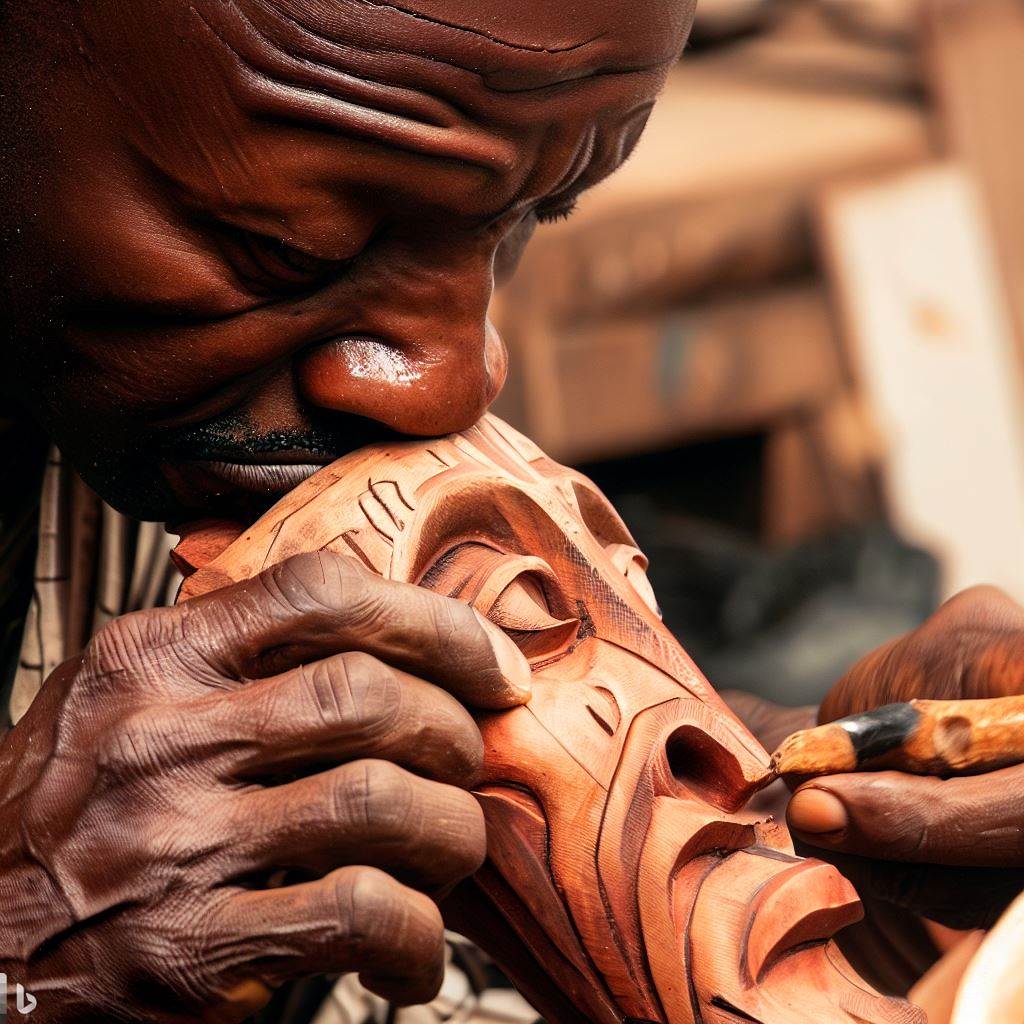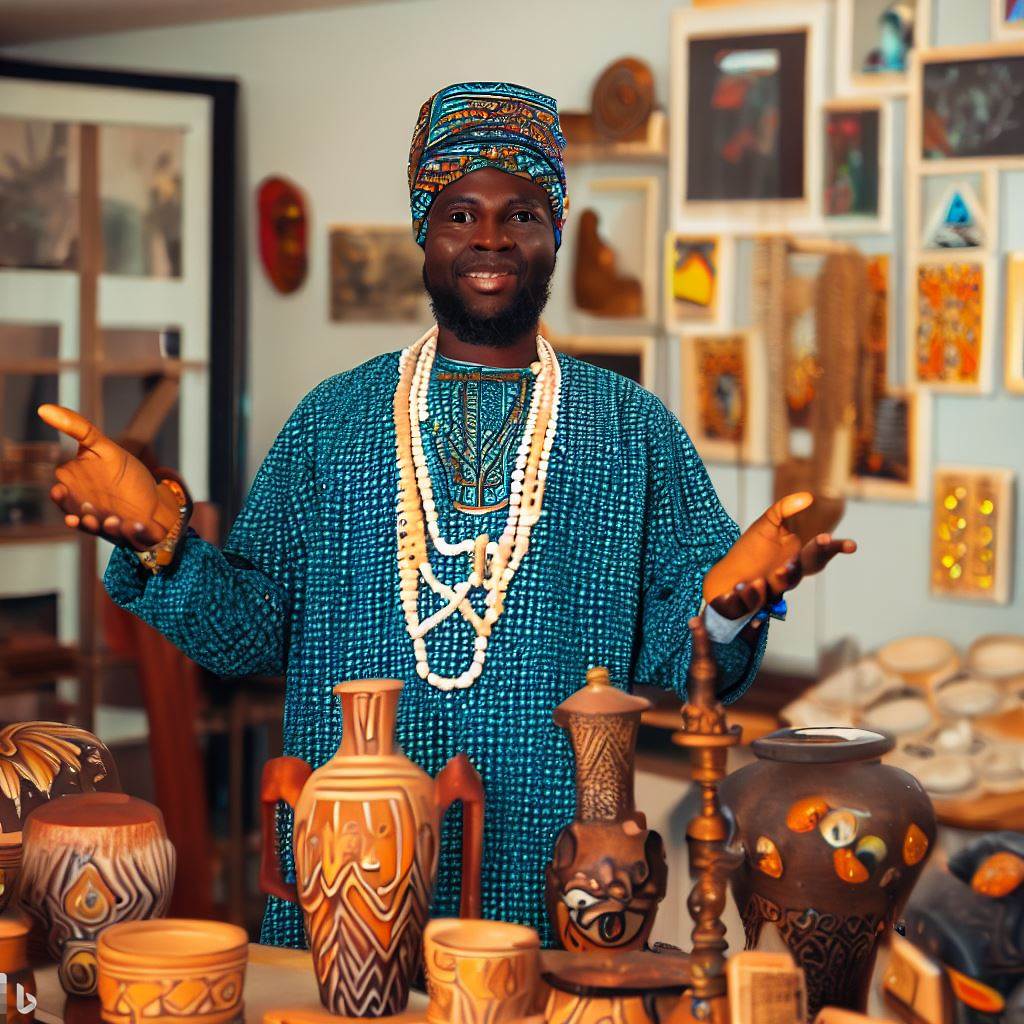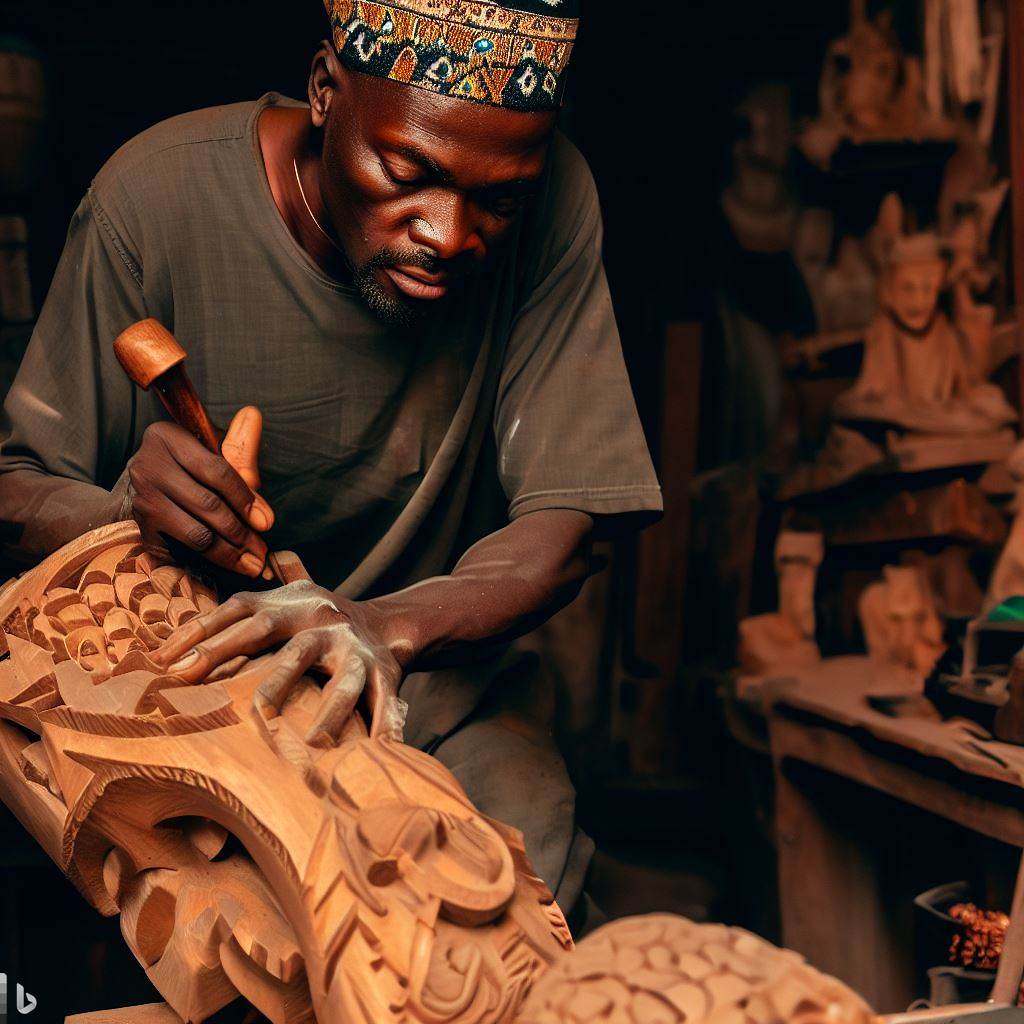Introduction
Craftsmanship has always been an integral part of Nigerian culture, encompassing various forms such as weaving, carving, pottery and more.
These crafts serve as a means of preserving the country’s rich heritage and traditions. The importance of craftsmanship in Nigeria cannot be overemphasized, as it plays a significant role in promoting and sustaining the nation’s culture and economy.
This section will explore the history of craftsmanship in Nigeria, highlighting the impact it has had on the country’s development.
The thesis statement of this post is that craftsmanship in Nigeria is a critical aspect of the country’s culture and economy, and understanding its history is essential to appreciate the role it plays in modern Nigerian society.
The Origins of Nigerian Craftsmanship
Craftsmanship has been a significant part of Nigerian culture for centuries. In the pre-colonial era, Nigerians practiced a wide array of crafts, from pottery, weaving, and carving to metalworking, leatherworking, and bead-making.
These crafts were not just a means of creative expression but also played a crucial role in the local economy.
Overview of the Pre-colonial Era
Before the arrival of Europeans in the 15th century, Nigeria was home to several ancient civilizations, such as the Nok, Ife, and Benin. These civilizations achieved exceptional artistic and technological feats, crafting bronze sculptures, terracotta figurines, pottery, and textiles.
Many of these artifacts have survived to this day, offering us a glimpse into the rich cultural heritage of pre-colonial Nigeria.
A Brief History of Craft in Nigeria
The history of Nigerian craft dates back to the Neolithic period when early inhabitants made pottery and stone tools.
Crafts evolved and diversified, with each ethnic group developing unique styles and techniques. The Yoruba people of southwestern Nigeria are renowned for their elaborate beadwork, and the Hausa people of northern Nigeria are known for their leatherworking skills.
During the colonial era, Nigeria’s craft industry suffered a significant setback as the British colonial authorities promoted European-style industries and trade.
However, after Nigeria gained independence in 1960, there was renewed interest in traditional crafts, and several initiatives were launched to support and promote the craft industry.
The Role of Craftsmanship in the Nigerian Economy
Today, Nigerian craft is a thriving industry that provides employment for millions of people across the country. The sector includes a wide variety of crafts, such as pottery, weaving, woodcarving, metalworking, and bead-making.
Many of these crafts are exported to other countries, generating significant revenue for the Nigerian economy.
Craftsmanship also plays a crucial role in preserving Nigeria’s cultural heritage. Through their crafts, Nigerian artisans maintain and transmit traditional techniques, designs, and motifs from one generation to the next.
Craftsmanship is also an essential part of Nigeria’s tourism industry, attracting visitors from all over the world who are interested in experiencing the country’s rich cultural heritage.
Nigeria’s rich history of craftsmanship is a testament to the creativity, skill, and ingenuity of its people.
From the ancient civilizations of the Nok, Ife, and Benin to the modern-day craft industry, Nigerian artisans have been producing exceptional works of art that reflect their culture, history, and identity.
As the country continues to develop and evolve, it is essential that we continue to support and promote the craft industry, ensuring that the skills and knowledge of our artisans are passed down to future generations.
By doing so, we can preserve Nigeria’s cultural heritage while also contributing to its economic growth and development.
Read: Eco-Tourism in Nigeria: Potential and Job Opportunities
Traditional Crafts of Nigeria
Nigeria is rich in traditional crafts that are embedded in Nigerian culture and history. These crafts are not just for decorative purposes but are also functional and symbolic.
The following are an overview of traditional Nigerian crafts, specific types of crafts, and their significance in Nigerian culture.
Overview of Traditional Nigerian Crafts
Nigerian artisans create traditional crafts using indigenous materials like wood, pottery, leather, cloth, and metal.
These crafts reflect diverse cultural heritage in different regions of Nigeria. They serve various purposes, such as utilitarian, religious, cultural, and art purposes.
The traditional crafts industry is a significant sector of the Nigerian economy, providing employment to millions of Nigerians.
The industry generates substantial revenue for the country and contributes to the promotion of Nigerian culture abroad.
Specific Types of Crafts
There are various types of traditional Nigerian crafts. The following are some of the major ones:
Pottery
Pottery is one of the oldest traditional crafts in Nigeria. It involves the shaping of clay into different forms using a potter’s wheel and firing it in a kiln.
The pottery produced in Nigeria is of high quality, and it is used for functional purposes like cooking and storing water.
Some of the major pottery-producing areas in Nigeria are Shonga in Kwara state, Giri in the Federal Capital Territory, and Ladi Kwali Pottery Centre in Abuja.
Woodcarving
Nigeria has a long history of woodcarving, which dates back to pre-colonial times. Woodcarving is a significant traditional craft that is used for functional and artistic purposes.
Nigerian woodcarvers produce items like masks, figurines, drums, and furniture. Some of the major woodcarving centers in Nigeria are Oyo, Ibadan, Ondo, and Osogbo in Osun state.
Weaving
Weaving is another traditional craft practiced in Nigeria. Nigerians use different materials to weave fabrics, including raffia, cotton, and silk.
The fabrics produced are intricately designed and woven in different patterns. Some of the major weaving centers in Nigeria are Kano, Benue, and Ogun states.
Significance in Nigerian Culture
Traditional Nigerian crafts are significant in Nigerian culture as they reflect Nigeria’s rich cultural heritage.
The crafts are used for various purposes like religious, cultural, and art purposes. They tell stories about the Nigerian people’s way of life, beliefs, and customs.
The crafts also serve as a means of connecting the present generation with their past.
They are a reminder of the sacrifices, creativity, and ingenuity of their forefathers. The crafts also serve as a source of pride for Nigerians as they celebrate their cultural heritage and identity.
In essence, traditional Nigerian crafts are an essential aspect of Nigeria’s cultural heritage.
They reflect the diversity, creativity, and ingenuity of the Nigerian people. The crafts are not just for decorative purposes, but they are also functional and symbolic.
They serve as a reminder of the country’s history and provide a means of connecting the present generation with their past.
It is, therefore, crucial for Nigerians to value and preserve their traditional crafts as they are part of what makes Nigeria unique and outstanding.
Read: The Intricacies of Running a Nigerian Taxi Service

Modern Applications of Nigerian Craftsmanship
The impact of colonialism on craftsmanship in Nigeria:
- During colonialism, Nigeria’s artisans were limited to producing crafts that appealed to European tastes, resulting in the loss of traditional skills and techniques.
- The British administration also introduced mechanization, which replaced handmade crafts and resulted in the decline of the country’s traditional crafts.
Modern applications of Nigerian craftsmanship:
- Nigerian craftsmen are now applying their traditional skills and techniques to contemporary designs and products, including furniture, fashion, and home decor.
- Nigeria’s rich cultural heritage and diverse natural resources are inspiring Nigerian craftsmen to develop innovative products that showcase the country’s unique identity.
- Handmade Nigerian crafts are also gaining popularity in the global market and attracting international customers who appreciate their authenticity and quality.
The contribution of Nigerian craftsmen to the contemporary art world:
- Nigerian craftsmen are making significant contributions to the contemporary art world by creating unique and innovative works that combine traditional techniques with modern materials and aesthetics.
- Many Nigerian artists and designers are using traditional crafts as a means of expressing their cultural identity and promoting cultural diversity.
- Their works are being exhibited in major art and design events and are garnering international recognition and acclaim.
In summary, Nigerian craftsmanship has a rich history dating back centuries and has played a central role in the cultural, economic, and social development of the country.
Although the impact of colonialism on traditional crafts was significant, Nigerian craftsmen are now using their traditional skills and techniques to create contemporary designs that showcase their unique identity and cultural heritage.
They are also making significant contributions to the contemporary art world and promoting cultural diversity on the global stage.
Read: Entrepreneurship in Nigeria’s Travel and Tourism Sector
Uncover the Details: Success Stories: Notable Nigerian Craftsmen
Challenges to Maintaining Nigerian Craftsmanship
Nigeria has a rich history of craftsmanship, but there are several challenges that pose a threat to the sustainability of this tradition.
These challenges are both economic and environmental in nature and have been worsened by changes in Nigeria’s social fabric.
Economic and Environmental Challenges
The economic challenges facing craftsmen in Nigeria are numerous. Firstly, the high cost of raw materials and equipment makes it difficult for artisans to produce quality goods at affordable prices.
This has led to artisans abandoning their craft in favor of more lucrative professions.
Additionally, environmental challenges such as climate change have affected the availability of some raw materials.
For example, the devastation of Nigeria’s forests has led to a scarcity of wood, which is a vital resource for many craftsmen.
This scarcity has caused a rise in the cost of wood, further compounding the economic challenges faced by artisans.
Changes in Nigeria’s Social Fabric
Nigeria’s social fabric has undergone significant changes in recent years. These changes have had a profound impact on the country’s craftsmen.
Firstly, the rise of technology and globalization has led to a decrease in demand for traditional crafts.
Many Nigerians now prefer factory-made products that are cheaper and more durable than handmade goods.
Furthermore, there has been a decline in the respect and recognition given to craftsmen in Nigeria. In the past, craftsmen were highly respected members of their communities.
However, this tradition has been on the decline in recent years, with many young Nigerians no longer interested in pursuing crafts as a profession.
Lack of Institutional Support
The absence of training programs, financial assistance, and supportive policy frameworks threatens Nigeria’s craft industry.
Institutions promoting and protecting craft heritage are lacking, leaving craftsmen vulnerable and risking the loss of their rich history.
Economic and environmental challenges, compounded by changes in Nigeria’s social fabric, exacerbate the situation.
Read: Nigeria’s Transport Infrastructure: Career Opportunities
Conclusion
Overall, exploring the rich history of craftsmanship in Nigeria is crucial for understanding the country’s cultural heritage and identity.
Support local artisans, promote traditional crafts, and create educational programs to pass on skills for preserving Nigerian craftsmanship.
Continuing to preserve Nigerian craftsmanship not only helps to sustain culture, but also provides economic opportunities for artisans and promotes Nigeria’s unique creative industries.
Recognizing and celebrating skills and craftsmanship passed down through generations is vital for Nigeria’s rich cultural heritage. By doing so, we can honor Nigeria’s history and create a brighter future for its artisans and creative industries.




